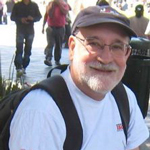Robert Roseth

Bob retired as director of UW News & Information in 2014. While still working full time, he served on UWRA’s board and eventually as our president. Also during his working life, he helped found the UW’s Professional Staff Organization and served on early boards of Seattle Repertory Jazz Orchestra, Seattle Jazz Ed, and the League of Education Voters.
Post-retirement, Bob worked as a UW Encore fellow and has volunteered with Seattle Youth Tutoring, with the State of Washington as a long-term care ombudsman, and as an online English language partner for adult students in Colombia and Costa Rica. Oh, and he just published his first novel, Ivy is a Weed, a mystery set on the campus of a large public university.
Bob Roseth talked with us recently about his experience creating a meaningful
and purposeful retirement.
You were fully engaged as an employee – not only in a big job, but also through deep involvement in PSO and UWRA. What was the transition to retirement like?
Shortly after my 64th birthday, my wife Kathy and I went to a financial adviser. One of the questions he asked was, when did I want to retire. I said, “Next year.” Right away Kathy looked at me – “Are you serious?” I guess I hadn’t articulated it, but clearly it had been in my mind for a while.
It was lucky timing that, just after I retired in 2014, Laura Saunders and I had the opportunity to serve as Encore Fellows. The idea was to explore and bring back information that could help the retirement association and the university to think more about how they could avail themselves of the expertise of retired faculty and staff.
I was involved with nonprofits already, but I knew I didn’t want to serve on a board any more – I wanted to be more involved directly with whoever the clients were. The fellowship let me stick my nose into a lot of places and develop a short list of promising partners. The Seattle Youth Tutoring program I did was an outgrowth of that exploration.
So, it sounds like you had done some thinking before you retired, then some thinking during that Encore time, and so you never really had a fallow period. You sort of moved right into the next thing.
That’s right, and it was interesting, because I would go to the events when UWRA brought in the university president to thank the people who were retiring. There was always a certain percentage of the retirees in attendance who definitely had that deer in the headlights look. It was like, I’ve retired, now what the hell do I do?
And there was another group who had a fear of that reaction, and so they just didn’t retire. My wife, Kathy, is very planful, so she didn’t want me to close up the office, bring home the box, and then sit here and scratch my head trying to figure out what I was going to do.
Story continues below…
Hear the Full Conversation
Listen to our wide-ranging and thought-provoking discussion with Bob about finding meaning in retirement.
I know you are a long-term-care ombudsman for the State of Washington. What have you enjoyed about that role? Has it given you any insights into this current COVID-19 crisis?
Right now, of course, I can’t go in. When I could make visits, I helped some people with some minor issues, but mostly I got to hear stories about their past life that they probably hadn’t even told their kids. People that have lived through great changes, people that have traveled the world.
My reaction to what’s going on with COVID has been visceral. What’s happened has been catastrophic for older adults in congregate care. Some of these facilities, no matter how well-run, have just been unlucky with how the epidemic has run through them.
One thing this experience has helped me see is how little we value old people. I get notices about when they are going to have testing available for people in skilled nursing facilities. They set a deadline, which was missed. They still don’t have the testing available for these people. At the same time, athletes are going back to campuses, and they’re all going to be tested weekly. In what universe do you decide that testing healthy 19-year-olds is more important than testing vulnerable adults who we know are at huge risk? How does this make sense?
Any last thoughts or advice for new retirees?
The gift of retirement is to say, what elevates my spirit? I think a lot of people don’t know what the answer is to that question. But if retirement is a quest, then it’s a quest for that kind of meaning, where you begin to look at the things that are really going to make you feel good.
The kinds of experiences I’ve had over the past few years have been really significant, in every respect: publishing a book, having a good friend — my Spanish conversation partner — who is starting to make the transition from seeing herself as a student to seeing herself as a teacher. We get along so well. I couldn’t have gone out and recruited someone and had a better match, someone with whom I have so much fun. We look at each other and say, “aren’t we lucky?” Everybody should try and find something close to that. I hit the jackpot.

